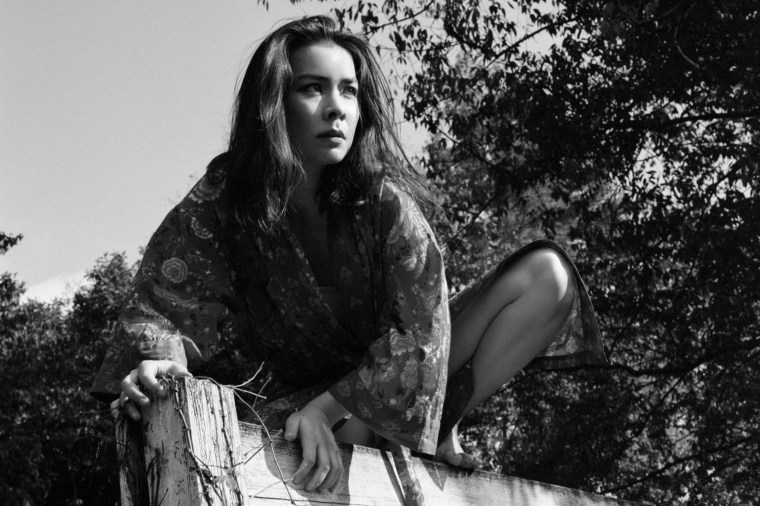Japanese American singer-songwriter Mitski Miyawaki says her identity is made up of “a million selves” that defy categorization — and fans are saying they find inspiration in that.
“I don’t have a self,” Mitski said on the website for her record label. “I have a million selves, and they’re all me, and I inhabit them, and they all live inside me.”
“The Land Is Inhospitable and So Are We,” Mitski’s newest album, released last week by music label Dead Oceans, explores her multitude of selves, she says. Featuring a choir and orchestral arrangements, the album draws from classic Americana imagery such as freight trains, buffalo stampedes and highway cars.
With this album, Mitski is trying to “reconcile all my various identities with being American,” she said in an interview with NPR. “I’m Asian American. I’m half white, half Asian. And so I don’t really fit into either community very well. I am an other in America, even though I am American.”
Mitski’s oscillation between different identities resonates with fan Sunny Dizon, who feels she’s had to do the same to navigate her identity as a Filipina American transgender woman. Dizon, a 24-year-old from Jerseyville, Illinois, said she was the only Asian kid at school and the only Asian family she knew of. She remembers going to the science fair knowing she was fulfilling a stereotype, or joining theater knowing it wasn’t what people expected of her. Her Asian American identity to her was confusing and isolating.
“We’re not really fully American because we emigrated," Dizon said. "We’re not really Asian because we left Asia. But we still are Asian, like fundamentally so. It feels like a weird contradiction, an in-between kind of space. Like I’m put in a suit that isn’t really made for me.”
Performing identity — especially racial and gender identity — feels to Dizon like suits she’s had to constantly put on. Listening to Mitski, Dizon identifies with her “struggles to find her place, in her interpersonal relationships and in the world at large.”
Like Mitski, Dizon says her struggles with identity are a struggle with America itself: “There’s a power fantasy behind being American … to have a lot of land, to have a gun with which I could defend it, to have this giant pickup truck that takes up a lot of space. Those things seem inherent in being an ‘American man.’ I never wanted to do that, but that was something that was expected of me.”
Victor Phun is a 26-year-old Vietnamese American who grew up in a predominantly white neighborhood in Mickleton, New Jersey. He remembers feeling self-conscious about his race around his friends’ white families, but also toward fellow Asian friends.
“With my Asian friends, it’s how they talk about specific cultural foods I don’t know, or travel plans in Asia, or even the language, because I don’t know Vietnamese that well, and it’s something I’m insecure about,” Phun shared.
“It’s lonely, and it’s isolating,” Phun said about his identity. “I don’t think I was ever bullied over it, but it was just something lingering like a sense of otherness where I don’t belong, but that I can’t quite place and don’t know what to do with.”
Phun said Mitski’s song “The Frost” captures his feeling of racial isolation. In it, she sings of an aching loneliness after the loss of a friend: “Now the world is mine alone / With no one, no one to share the memory.” The song ends with the narrator all alone, saying: “It’s just witness-less me.”
“It’s this feeling that there’s no one to tell or to share what I’m feeling with,” Phun said. “I have these emotions that I don’t know what to do with, and all I can do is internalize them.”
Ariana Swei, who identifies as queer and uses they/them pronouns, is a 23-year-old mixed media artist from Connecticut, now living in Brooklyn, New York. Like Dizon and Phun, Swei grew up in majority-white environments and struggled to navigate the label “Asian American”: “I don’t feel fully Asian because I was born here. I’m not super close with my family in Taiwan, and I feel a disconnect with my parents, partly because my mom experienced coming here as an immigrant and I didn’t.”
As an Asian American artist, Swei said they were inspired by Mitski’s decision to remain uncategorizable in her music and identity. “There’s a pressure to sort of market yourself with your most marginalized identities, so that people will listen or look at your work, even if your work isn’t really explicitly about that,” Swei explained. For Mitski to maintain these various identities, Swei said, means she’s confident and authentic in her artistry, which is something Swei hopes to achieve in their own career as a queer Asian American artist.
